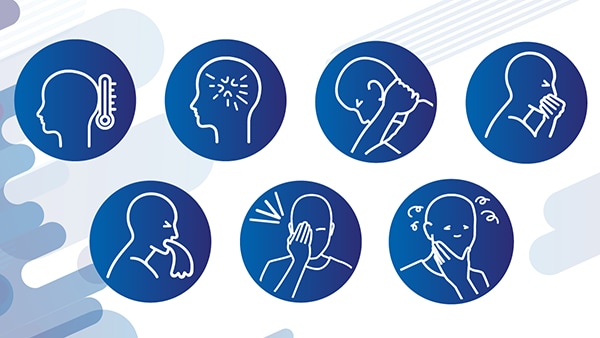Key points
- Fungal meningitis is a rare fungal infection of areas around the brain and spine.
- In people with weak immune systems, fungal infections anywhere in the body can develop into fungal meningitis.
- Rarely, it can be caused by contamination during medical procedures.
- It is difficult to diagnose and requires antifungal treatment.

What it is
Fungal meningitis is very rare and causes swelling in areas around the brain and spinal cord.
In people with weak immune systems
In people with weak immune systems a fungal infection anywhere in the body can spread to the brain and spine. For example, breathing in fungal spores outdoors can cause a lung infection that can spread and lead to fungal meningitis.
Some fungi that can cause infections leading to fungal meningitis include:
Associated with medical procedures
Rarely, people can get fungal meningitis after medical procedures if all infection control practices are not followed. Contaminated medicines or medical equipment can allow fungi to get into the brain or spinal cord. This can happen with many types of fungi.
Symptoms
People with fungal meningitis may start off with mild symptoms that develop into typical meningitis symptoms.
- fever
- headache
- stiff neck
- nausea
- vomiting
- light sensitivity
- confusion
When to seek emergency care
Risk factors
Anyone can get fungal meningitis, but some people are at increased risk.
Typically, only people with weakened immune systems develop fungal meningitis from fungal infections. Certain health conditions (like HIV infection and cancer), medications, and surgical procedures may weaken the immune system. Medications that can weaken the immune system include:
- Steroids (such as prednisone)
- Medicines given after organ transplantation
- Anti-tumor necrosis factor (TNF) medicines
Anti-TNF medicines are sometimes given to treat rheumatoid arthritis or other autoimmune conditions.
Who is at risk
Premature babies with very low birth weights are at increased risk for getting Candida bloodstream infection. These infections can spread to the brain.
Living in certain areas of the United States may increase the risk for fungal lung infections. These infections can spread to the brain or spinal cord.
People who have surgical procedures can get fungal meningitis, but it is very rare.
How it spreads

From the environment
Many fungi that can cause meningitis live in the environment. People can get sick if they breathe in fungal spores.
From inside and on the body
Candida normally lives inside the gut and on the skin without causing any problems. However, Candida can enter the bloodstream or internal organs and cause an infection.
Associated with healthcare procedures
While rare, outbreaks of fungal meningitis following medical and surgical procedures have occurred. People can get infected during medical procedures if all infection control practices aren't followed.
Information for healthcare providers
How it doesn't spread
Fungal meningitis doesn't spread between people.
Reducing risk
People with weak immune systems can take steps to reduce their risk. It's especially important for those who live in areas where these fungi are found.
Avoid exposure to dust and dirt
Try to avoid areas with a lot of dust like construction or excavation sites. If they're unavoidable, wear an N95 respirator (a type of face mask) while there.
- Stay inside during dust storms and close windows.
- Avoid activities that involve close contact with dirt or dust.
Use good wound care
Clean skin injuries well with soap and water to reduce the chances of developing a skin infection. This is especially important if the wound was exposed to dirt or dust.
Other prevention strategies
- Use air filtration measures indoors.
- Take preventive antifungal medication if prescribed.
Testing and diagnosis
There are laboratory tests for meningitis. Tests might include a spinal tap, where a long needle collects fluid from around the spine for testing.
Treatment and recovery
Healthcare providers treat fungal meningitis with high-dose antifungal medicines, often given directly into a vein through an IV. After that, people also need to take antifungal medicines by mouth.
The total length of treatment depends on each person's immune system and the type of fungus causing the infection. Treatment is often longer for people with weak immune systems.

